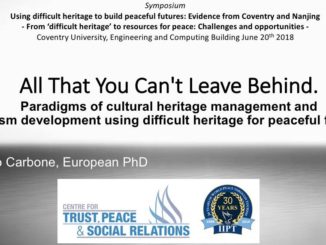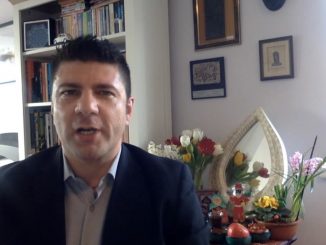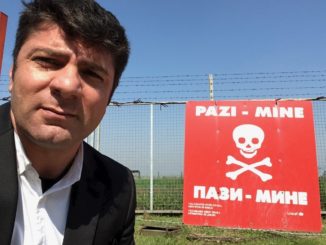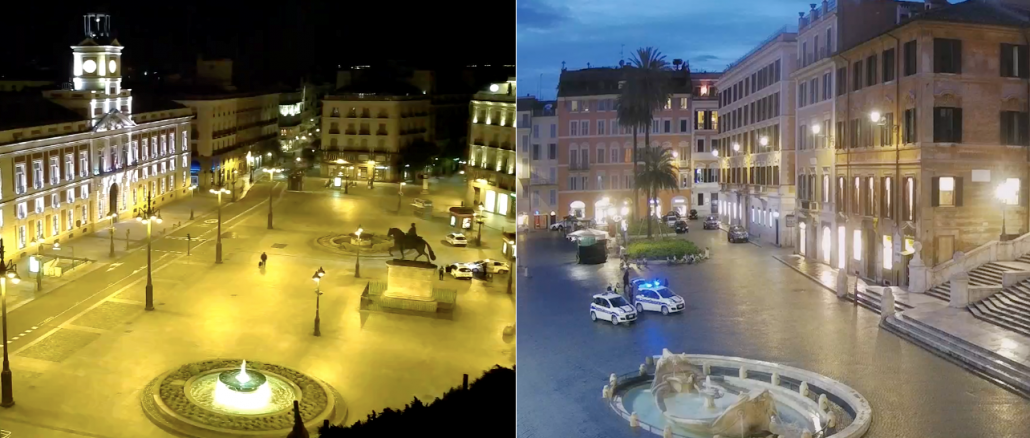
Yearning for a new humanism to build inclusive societies and sustaining peace
Chaos gives birth to dancing stars (Friedrich Nietzsche)
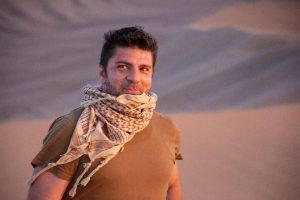
A Cherokee legend talks about the existence of two wolves in our hearts. There is a black wolf, carrying negative feelings such as anger, hatred, jealousy, envy, resentment, selfishness; and there is a white one, made of peace, love, hope, generosity, compassion, humility and faith. The two wolves are constantly in conflict inside our heart. Which one of them will prevail? “The one we will feed the most”, the Cherokee legend concludes.
In these days of lockdown, looking at the world from the virtual window of the Information Technologies and media, this legend keeps coming to my mind, and I would like to share here the reason why. Today’s situation is unprecedented for most of us, considering that the last similar situation was the so-called Spanish Flu, which left 50 to 100 million dead. But all that, was immediately after the Great War (1918). For most of us, then, scenarios like that of these stormy, dramatic days we all are living can only call to memory some science fiction movies. A scenario of uncertainty, anguish, and unfortunately also mourning. A scenario that, however, can also lead us to great hopes for the future of humanity, if analysed in the perspective of the Cherokee legend of the two wolves.
COVID-19 pandemic is forcing all of us worldwide to make sudden and drastic changes to our lifestyle. Some of these changes, experts say, may not be temporary. Nevertheless, their discourses on this matter, as valid as they are, appear limited to aspects such as “a most consistent use of smart working in the future”, and things like that. Instead, I feel more inclined to consider another aspect, and this is where the legend of the two wolves comes into play. My consideration in fact concerns the types of responses of communities and individuals to the emergency worldwide.
On the one hand, we witness generous acts by ordinary people, professionals, companies, that while remaining safe, are discovering creative and sincere ways to look at the others, to help other individuals and communities, to value and protect their own kind worldwide. The solidarity, the self-denial of doctors, paramedics, law enforcement and military, hundreds of people on their balconies singing together to cheer each other up, united though distant. They are – we are! – demonstrating to be able to put into practice values that make our world a better place.
But then I turn my eyes, I read the next news, and I see other, less “comforting” behaviours linked to the pandemic: new forms of racism, the queues to buy weapons and snap up the largest possible amount of ammunition, the brawls and the fights at the supermarkets just to grab the last roll of toilet paper, the last can of beans. And then, the politicians: at national level, we see some of them worldwide trying to seize the opportunity given by the chaos and fear to bypass democracy, or anyway to gain votes and consensus for the next election. At supranational level, terrible manifestations exist of a lack of sense of solidarity: see the debate within the European Union about the “economic risk” of helping the member States in need (!); see the US choice to maintain the embargo on countries like Iran, despite the pandemic, thus becoming directly responsible for hundreds of deaths, even among very young people that with the right medicines and medical facilities would instead have survived the COVID-19; see the persistence of Israeli odious siege on Palestinians, despite World Health Organization warned about the fact that Gaza has only 50 percent of the medications it needs, and they have currently 85 respirators in the Strip, 20 of which are for children, and in any case, these respirators are of a type cannot be used by coronavirus patients!
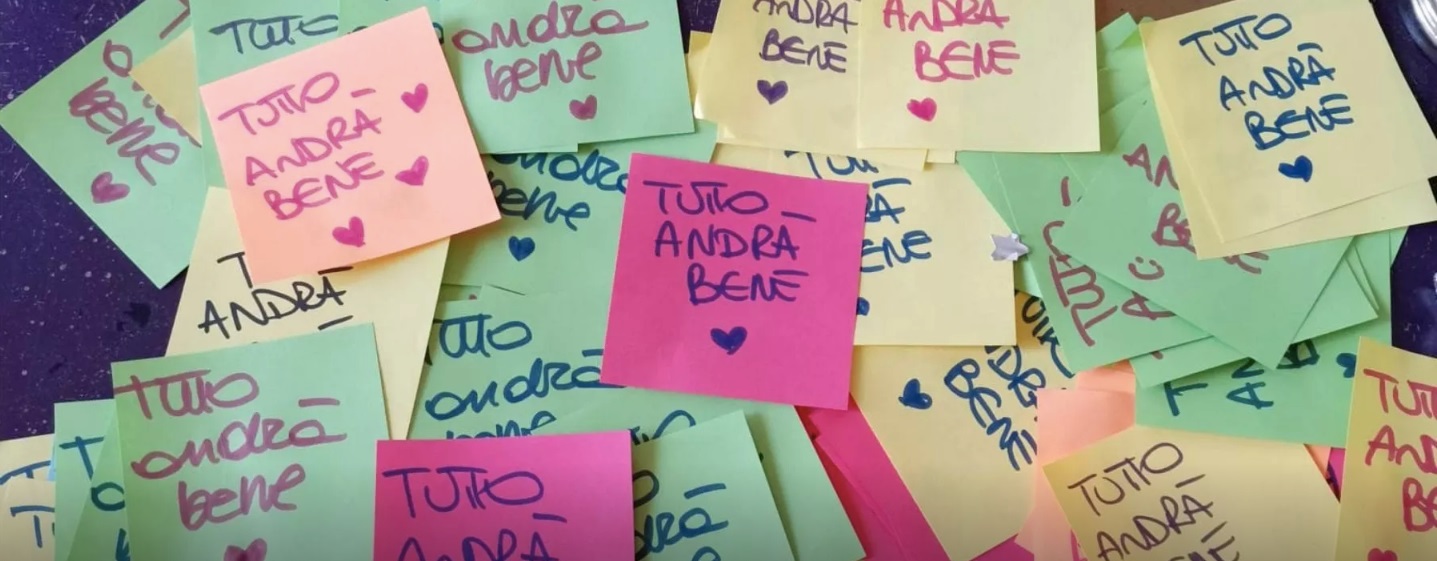
Furthermore, I think about the migrants who continue to flee and continue to meet on their way barbed wire and contempt, instead of compassion and serious measure to protect their dignity and security. What will happen when the COVID-19 will reach them too, who are totally deprived of any defence and help? And still, what about the population living in war zones? International leaders, focused as they are on dramatic domestic issues, have little or no time to devote to conflicts or peace processes, as the UN Secretary General António Guterres warned in his call for a global ceasefire few days ago: “The most vulnerable — women and children, people with disabilities, the marginalized and the displaced — pay the highest price. (…) Let’s not forget that in war-ravaged countries, health systems have collapsed. Health professionals, already few in number, have often been targeted”.
Well, here it is, then, the urgency of applying the perspective of the two wolves’ legend to our society: the pandemic is giving us – although through highly dramatic moments of great suffering and pain – the opportunity to watch quite clearly at the two wolves that exist in us, at individual and collective level. Being so aware about their existence, put us in the condition to decide consciously which one of them we want to “feed more”, to recall the Cherokee legend. So, if on the one side experts already understood what new professional behaviours will remain in the post-pandemic society, on the other, it is time to ask ourselves which wolf we will feed and will remain among us for the future, and which one we will instead give away to COVID-19!
In this sense, the speech that Charlie Chaplin wrote for his Great Dictator (1948), echoes today more topical and meaningful than ever:
We all want to help one another; human beings are like that.
We want to live by each other’s happiness.
Not by each other’s misery.
We don’t want to hate and despise one another.
We have developed speed, but we have shut ourselves in.
Machinery that gives us abundance has left us in want.
Our knowledge has made us cynical.
Our cleverness, hard and unkind.
We think too much, and feel too little.
More than machinery, we need humanity.
More that cleverness, we need kindness and gentleness.
Without these qualities, life will be violent, and all will be lost.
Tough to get more appropriate than that! And a final consideration: these reflections also have to do with our beloved sector: tourism. When we shall return to travel, we shall find a changed sector, but again, the type of change will depend largely on us, and will be hopefully inspired by the drastic reduction of pollution that we are witnessing as immediate result of a reduced pressure on Mother Earth; inspired by the clear waters of the finally decongested canals of Venice in these days, telling us a lot about our responsibility towards the natural and sociocultural impact on destinations; inspired by the calm, majestic beauty of the empty cities, if compared with the abomination of overtourism. For a post-COVID-19 rebirth of tourism, let’s get inspired by the work made by Louis D’Amore, founder of the IIPT, and by Taleb Rifai’s final words as UNWTO Secretary General: “whatever our business in life may be, let us always remember that our core business is, and will always be, to make this world a better place”.
Let’s thus take this opportunity also to change our way of understanding, planning, managing and doing tourism. We were able to achieve the unthinkable: we sent tourists up into space! With the same determination it’s time now to bring them back to Earth and build together a world of greater solidarity, brotherhood and peace!
“In the 17th Chapter of St Luke it is written: “the Kingdom of God is within man” – not one man nor a group of men, but in all men!
In you!
You, the people have the power – the power to create machines.
The power to create happiness!
You, the people, have the power to make this life free and beautiful, to make this life a wonderful adventure.”[1]
Stay safe. Stay strong. Stay hopeful. Stay distant, but united!
Fabio Carbone
(IIPT ambassador-at-large )
[1] From the Great Dictator, Charlie Chaplin, 1948

